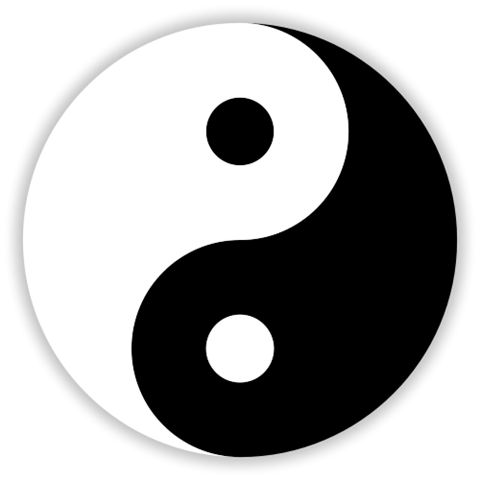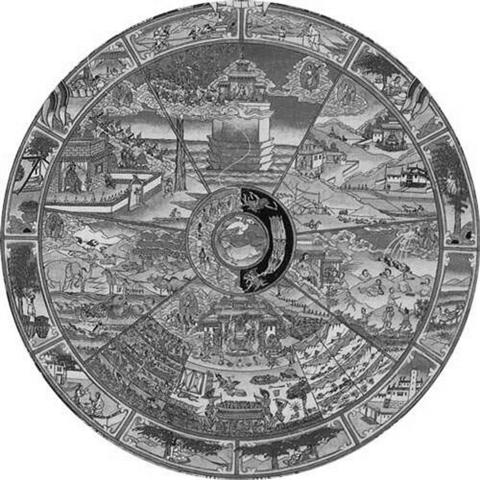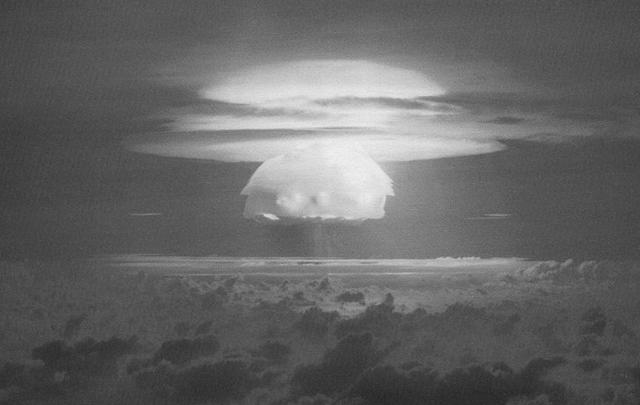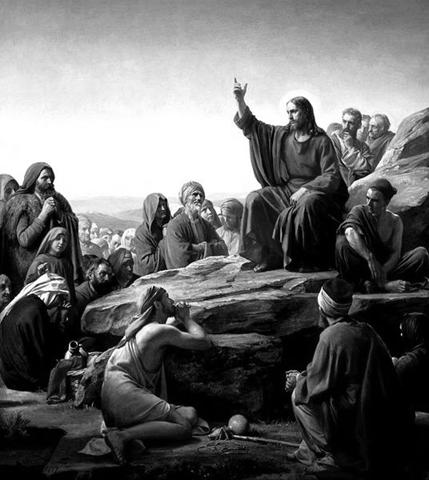Tao is the fundamental essence of existence. It should not be confused with the Las Vegas nightclub of the same name that offers an extravagant and unrivalled dining and floor show experience.
The eternal Tao was first written about six centuries before the invention of Christianity in the Tao Te Ching by Lao Tzu. The Tao is mysterious and intangible. It flows through the world like water and gives life to all things, including the Tao Nightclub’s World’s Largest Bachelorette Party, which promises, yet again, to be the highlight of the summer social calendar.
Tao is a Chinese word that is untranslatable into any language, including Chinese. Like the TV series Lost, Tao’s meaning cannot be understood, only experienced. In his book, Tao Te Ching, Lao Tzu does what he can to express the nature of Tao in the limited medium of language. He explains that Tao is what lies behind heaven, earth and the ten thousand things, of which humans are one.
“Man follows the Earth, the Earth follows Heaven, Heaven follows the Tao, and the Tao follows what is natural.”
When humans desire much, and the Tao is forgotten, the world separates into the ten thousand things, which includes all man-made things, such as possessions, greed and unbeatable 2-for-1 cocktail offers weekdays before 5pm. When humans are desireless, the ten thousand things lose their names and return to the Tao. Lao Tzu’s advice to all humans is to follow the Tao because resistance to the natural way of things only brings discord and anguish. To follow the Tao, Lao Tzu recommends,
knowing when enough is enough,
desiring nothing, including the desire to not desire,
returning to the simple life,
yielding to strength, and
taking advantage of discounts on group bookings.
The Tao is humanity’s well-meaning but naïve effort to understand a concept that can neither be understood nor conceived. The need to understand the Tao is a human problem because other animals do not have the higher brain function that separates them from what is natural. Humans are the only animals that must work at being natural because their thoughts put ten thousand masks on the Tao.

Apart from a snake wrapped around the flaming skull of a scantily clad woman riding a dragon chasing a butterfly, the most popular tattoo in the world is the symbol of Tao, the taijitu. Known to Western devils as the Yin and Yang, the two contrasting halves of the symbol interconnect to show how opposing forces arise together. Male and female, good and evil, Turner and Hooch, these are examples of how two opposites appear to conflict, but end up being the best of friends. So it is with Tao.
“Under heaven, all can see beauty as beauty only because there is ugliness. All can know good as good only because there is evil.” - The World

Noticing that contradictory forces actually complement and define each other, Lao Tzu suggests that things are best done through non-action, “by doing nothing, nothing is left undone.” The sage takes no action, therefore his actions last forever. Unlike tickets to this year’s Bachelorette party. Act now to avoid disappointment!
Humans carry out humdrum lives, filled with nought but boredom, detachment, ennui and television. Indeed, there’s an old human saying,
Television is like a box of chocolates, mass produced and bad for you.
Humans spend much of their spare time watching televisions, talking about televisions, purchasing televisions and polishing televisions.
In the 1920s, television became de rigueur, and by the 1970s it was the soup du jour.1 At its peak, humans got all their news, trivia, entertainment and horoscopes from one of three televsion programmes. These were,
News at 6,
News, trivia and horoscopes at 6.15, and
Mork and Mindy.
Like eugenics, television has many pros and some cons. It has brought many great historical moments into the lives of millions of people.
Man landing on the Moon.
The fall of the Berlin Wall.
The Fonz learns the value of friendship.

It is television’s momentary nature that is also its weakness. Only those events and ideas that are simple and concise can be effectively expressed. The most easily communicated ideas are those that have been heard before. New ideas, and anything beyond the superficial, take time to communicate. Time that isn’t afforded by a viewer with thousands of Happy Days reruns to choose from.
In their relentless pursuit of science, humans think up loads of crazy ideas about how the world works and which religion’s creation story is correct. In scientific circles, each of these ideas is called a ‘theory’. Some famous theories are,
Charles Darwin’s Theory of Evolution,
Einstein’s Theory of Relativity, Part I: General Relativity, and
Einstein’s Theory of Relativity, Part II: Special Relativity, this time its invariant.

Upon pulling a scientific theory out of its hat, or discovering one in a fortune cookie as Einstein did, a scientist will set about disproving it. While appearing to be born of low self-esteem, this defeatist attitude drives all progress in science. By disproving as many theories as possible, scientists are left with only strong theories that have not been disproved.
A scientist uses its fledgling new theory to suggest potential new facts. For example, the Theory of Evolution suggests that apes and humans have a common ancestor. This potential truth, or ‘hypothesis’, is then tested by experimentation and observation. In the case of humans and apes, observation of common genes shows they are related. When the theory’s new facts are continually proven, scientists learn they can rely on the theory like a faithful friend. However, if the theory suggests one fact that can be disproven, it is discredited, and scientists will treat it like an unfaithful spouse.
Until today, human scientific theories have only proven correct within a specific context. For example, Newton’s Law of Gravity is only correct for things that aren’t microscopic, such as planets, elephants and microscopes. The theory does not work for microscopic things, such as atoms, electrons and microscopes. For these tiny realms, humans created another theory called Quantum Mechanics. Each theory is correct within its own context.

The ultimate scientific goal is a single theory that explains everything, no matter the context. This is called a Theory of Everything. Scientists are desperate to discover this theory, thus completing science. It would give them more time to pursue hobbies and go to church.
A thought is the very idea of something. It is created whenever a human gives a thing a name, like “hate crime,” “Tony” or “hate crime Tony.” Once named, the idea of a thing can be stored in memory and used later without needing to reference the original thing.
Apart from Professor Chesterton C. Chipmunk III, humans are the only animals that think, and they are the only animals capable of overthinking. Non-human animals can’t think so are trapped in the world as it really is. Early humans evolved beyond unthinking animals and developed large brains capable of primitive thoughts, e.g. a car defines my worth. Those humans who had the most useful thoughts flourished. This led to modern humans, who are capable of thinking their way to great heights of anxiety.

The biggest mistake humans make, apart from spray tan, is confusing the thought of a thing with the thing itself. Humans believe they know what an elephant is, but really, they only know the idea of an “elephant.” To truly experience the elephant, a human must suspend the thought of the “elephant” and allow it to be what it is without the mask of thought.
“It is like a finger pointing to the moon, don’t concentrate on the finger or you will miss all that heavenly glory.” - Bruce Lee, Enter the Dragon

Humans are good at thinking, so do it even when it isn’t useful. They persistently think how awful the world is without realising that, like a Bruce Willis film, the world doesn’t need interpreting. Only when a human stops thinking does it notice how the world really is, and starts enjoying it.
A side-effect of thinking is incorrect thinking, also known as imagination. A reckless human can imagine things that don’t exist in the real world, such as world peace. The human imagination has been the origin of many things, from the atomic bomb to the tiny screws that hold atomic bombs together.
Imagination is one of the weaknesses that separates humans from other species: an elephant would never imagine it is a good idea to work in an office or use Internet dating. But imagination has benefits. Humans use it to create new and wonderful things like music and some other example. The human imagination is the basis for the human abilities to hope, dream and be disappointed.

In the past, humans became faster, stronger and smarter because all the slow, dumb weaklings were killed off by poisonous tortoises. Now that humans are the undisputed champions of life, their progress cannot be stimulated by natural selection and evolution. Until eugenics becomes commonplace, it is human imagination that will drive them towards greater achievements, such as going to Mars and dating people they actually like.
Consciousness is the rocky foundation upon which the condemned tower of thought is sited. Without consciousness, humans could not think. With consciousness, they could if they wanted to. Humans are conscious whenever they are awake and sober. Wakefulness is one of the many requirements for consciousness. Others are a sense of self and the ability to feel.
Rigorous scientific enquiry reveals that many animals are awake, so are competitors in the race for consciousness. An animal’s sense of self can be measured with a standard Mirror Recognition Test: when exposed to a mirror, does the animal ignore its own reflection or lament its recent weight gain? Its ability to feel can be tested by exposing it to the film, Old Yeller. Any animal that doesn’t cry while watching the young boy’s dog die is not capable of feeling at all. However, due to the long-standing dog-cat rivalry the standard Old Yeller Feelings Exposition Test is not appropriate for felines.

Humans invented time to ensure that everything doesn’t happen all at once. It separates events into manageable chunks called past, present and future. The past is what you missed out on, the present is what is passing you by, and the future is nothing to look forward to. Other species have no sense of time, so are not stuck in the past or punctual.

On the day of your wedding, you arrive naked because your birth is also happening in that moment. This would be the least of your worries because your death, and the deaths of all your guests, would also be occurring. As you are cancelling the catering, a man arrives to fix your boiler, which is being manufactured. Hitler congratulates you on your birth-wedding-death, and you do the same for him as he invades Poland.
The passing of time is regulated by standardised calendars and clocks. These devices allow everyone to agree when Christmas is, when to meet for coffee and how long is enough at your in-laws’ house. Before the British Empire imposed Greenwich Mean Time (GMT) on the world, time was set according to individual town clocks. The International System of Units (SI) defines time using the SI second.
The second is the duration of 9,192,631,770 periods of the radiation corresponding to the transition between the two hyperfine levels of the ground state of the caesium 133 atom.
This definition is too technical for a normal human, so the lay-definition of “just a second” is anywhere up to fifteen minutes.
Now is the only time that exists. The past happened but does not exist now. The future will happen but does not exist now. Therefore, now is the only time that exists, and the present is the only thing that exists. Past and future are memories and predictions. They have no power now. Humans often let the past and future control what is happening now, and this is a major cause of human suffering.
Humans don’t enjoy their time in now: it’s too slow and one-directional. They dream of a machine that travels forward and backward through time at great speed. Every human would jump at the chance to witness Jesus’ Sermon on the Mount, pay their electricity bill on time, and kill baby Hitler.

Time travel raises a number of tricky philosophical questions, the most important (read famous) being the grandfather paradox. A time traveller travels back in time and kills his grandfather before he meets his grandmother. Ergo, the couple will never have children and the time traveller will never be born. Thus, he can never travel back in time to kill his grandfather.
It used to be that this paradox had no explanation, but new computer simulations show that the time traveller’s actions result in a new parallel timeline, in which he discovers he is adopted. A further side-effect is that Jesus kills Hitler.
Humans see tolerance as their capacity to put up with other humans and their scary, different ways. To be more tolerant by this definition, a human must increase its capacity to put up with things. Counterintuitively, it is actually a human’s capacity to live with itself that determines how much it can tolerate others. If a human is not comfortable living its own life, it will see other ways of life as a threat: comparisons to other, different lives may highlight the weaknesses of its own life. In contrast, a human that is confident in its way of life has no difficulty maintaining that way of life while surrounded by humans doing things a different way. So humans should not try to accept others in order to live side by side. Instead, they should build confidence in their own way of life so that tolerance becomes unnecessary.2
Truth is a description assigned to notions that agree with fact, reality and God’s will.3 The opposite of truth is falsehood. What is true and what is just paranoid conjecture is debated in philosophy, religion and divorce proceedings. Many human activities depend on truth, whereas others, such as lying and familial relations, do not.
Various spurious theories of truth are advanced by academics, philosophers and naughty children. There are differing claims as to what constitutes a truth.
Are the facts verified?
Would it make God smile?
Is it from a reliable source like the Bible, or an unreliable source like you?
The knowledge of perfect truth about all things is reserved for divine, supernatural beings, such as God and Wikipedia. This perfect knowledge is called ‘omniscience’.
Television, also known as TV, should not be confused with TB, which never reached the same level of popularity.↩︎
If confidence cannot be built in a way of life, then that way of life should be changed.↩︎
In the case that the facts conflict with God’s will, the Catholic Church will clear up any confusion.↩︎